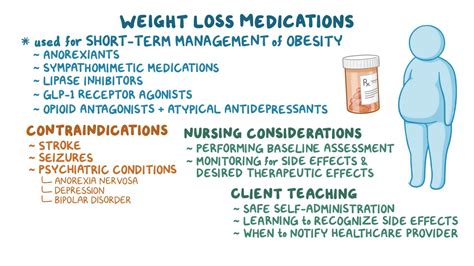Intro
Discover safe weight loss medicine options, including prescription medications and natural supplements, to help achieve your weight loss goals with a healthy diet and exercise, promoting sustainable fat loss and improved overall well-being.
The desire to lose weight is a common goal for many individuals, with millions of people around the world striving to achieve a healthier and more manageable weight. With the numerous weight loss methods and products available, it can be overwhelming to determine the most effective approach. One option that has gained significant attention in recent years is the use of weight loss medicine. Weight loss medicine can be a valuable tool for those struggling to lose weight, particularly when combined with a healthy diet and regular exercise.
For many people, losing weight is not just about aesthetics; it's also about improving overall health and reducing the risk of chronic diseases such as diabetes, heart disease, and certain types of cancer. Excess weight can put a significant strain on the body, increasing the risk of developing these conditions. By losing weight, individuals can significantly reduce their risk and improve their overall well-being. Weight loss medicine can provide the necessary support and motivation to help individuals achieve their weight loss goals.
The importance of weight loss cannot be overstated, and it's essential to approach this goal in a safe and sustainable manner. Crash diets and extreme exercise regimens may lead to rapid weight loss, but they are often difficult to maintain and can have negative consequences for overall health. Weight loss medicine, on the other hand, can provide a more balanced and sustainable approach to weight loss, helping individuals to achieve and maintain a healthy weight over the long term.
Understanding Weight Loss Medicine

Weight loss medicine refers to a range of prescription and over-the-counter medications designed to help individuals lose weight. These medications work in various ways, such as suppressing appetite, increasing feelings of fullness, or reducing the absorption of fat. Some weight loss medicines are designed for short-term use, while others can be used over a more extended period. It's essential to consult with a healthcare professional before starting any weight loss medication to determine the best course of treatment.
There are several types of weight loss medicine available, each with its own unique mechanism of action. Some of the most common types of weight loss medicine include appetite suppressants, fat absorbers, and combination medications. Appetite suppressants work by reducing hunger and increasing feelings of fullness, making it easier to stick to a diet. Fat absorbers, on the other hand, work by reducing the amount of fat that is absorbed by the body, resulting in weight loss.
How Weight Loss Medicine Works
Weight loss medicine can be an effective tool for weight loss, but it's essential to understand how it works. Weight loss medicine is not a magic bullet and should be used in conjunction with a healthy diet and regular exercise. By combining weight loss medicine with a balanced lifestyle, individuals can achieve significant weight loss and improve their overall health.Weight loss medicine can help individuals lose weight in several ways. For example, some medications can reduce hunger and increase feelings of fullness, making it easier to stick to a diet. Other medications can reduce the absorption of fat, resulting in weight loss. Additionally, some weight loss medicines can increase metabolism, helping the body to burn more calories.
Benefits of Weight Loss Medicine

The benefits of weight loss medicine are numerous, and it can be a valuable tool for individuals struggling to lose weight. Some of the most significant benefits of weight loss medicine include:
- Significant weight loss: Weight loss medicine can help individuals achieve significant weight loss, particularly when combined with a healthy diet and regular exercise.
- Improved health: Weight loss can improve overall health, reducing the risk of chronic diseases such as diabetes, heart disease, and certain types of cancer.
- Increased motivation: Weight loss medicine can provide the necessary motivation to help individuals stick to their weight loss goals.
- Reduced hunger: Many weight loss medicines can reduce hunger and increase feelings of fullness, making it easier to stick to a diet.
Common Types of Weight Loss Medicine
There are several types of weight loss medicine available, each with its own unique mechanism of action. Some of the most common types of weight loss medicine include:- Orlistat: Orlistat is a fat absorber that works by reducing the amount of fat that is absorbed by the body.
- Phentermine: Phentermine is an appetite suppressant that works by reducing hunger and increasing feelings of fullness.
- Qsymia: Qsymia is a combination medication that works by reducing hunger and increasing feelings of fullness.
Side Effects of Weight Loss Medicine

While weight loss medicine can be an effective tool for weight loss, it's essential to be aware of the potential side effects. Some common side effects of weight loss medicine include:
- Nausea and vomiting
- Diarrhea and abdominal pain
- Headaches and dizziness
- Increased heart rate and blood pressure
It's essential to consult with a healthcare professional before starting any weight loss medication to discuss the potential side effects and determine the best course of treatment.
Precautions and Contraindications
Weight loss medicine is not suitable for everyone, and there are several precautions and contraindications to be aware of. For example:- Pregnant or breastfeeding women should not take weight loss medicine.
- Individuals with certain medical conditions, such as high blood pressure or heart disease, should consult with a healthcare professional before taking weight loss medicine.
- Weight loss medicine can interact with other medications, such as antidepressants and blood thinners.
Combining Weight Loss Medicine with Lifestyle Changes

While weight loss medicine can be an effective tool for weight loss, it's essential to combine it with lifestyle changes for sustainable results. Some lifestyle changes that can be combined with weight loss medicine include:
- Eating a healthy and balanced diet
- Engaging in regular exercise, such as walking or jogging
- Getting enough sleep and managing stress
By combining weight loss medicine with lifestyle changes, individuals can achieve significant weight loss and improve their overall health.
Creating a Weight Loss Plan
Creating a weight loss plan can help individuals stay on track and achieve their weight loss goals. A weight loss plan should include:- A healthy and balanced diet
- A regular exercise routine
- A plan for managing stress and getting enough sleep
- A plan for tracking progress and staying motivated
By creating a weight loss plan and combining it with weight loss medicine, individuals can achieve significant weight loss and improve their overall health.
Maintaining Weight Loss

Maintaining weight loss can be challenging, but there are several strategies that can help. Some strategies for maintaining weight loss include:
- Continuing to eat a healthy and balanced diet
- Engaging in regular exercise
- Getting enough sleep and managing stress
- Tracking progress and staying motivated
By using these strategies, individuals can maintain their weight loss and improve their overall health.
Overcoming Obstacles
Overcoming obstacles is an essential part of maintaining weight loss. Some common obstacles that individuals may face include:- Lack of motivation
- Emotional eating
- Social pressures
- Plateaus
By developing strategies to overcome these obstacles, individuals can maintain their weight loss and improve their overall health.
What are the most effective weight loss medicines?
+The most effective weight loss medicines include Orlistat, Phentermine, and Qsymia. However, it's essential to consult with a healthcare professional to determine the best course of treatment.
How long does it take to see results from weight loss medicine?
+The time it takes to see results from weight loss medicine can vary depending on the individual and the type of medication. Some people may see results within a few weeks, while others may take longer.
Are there any natural alternatives to weight loss medicine?
+Yes, there are several natural alternatives to weight loss medicine, including green tea, conjugated linoleic acid (CLA), and glucomannan. However, it's essential to consult with a healthcare professional before starting any new supplement or medication.
Can weight loss medicine be used for long-term weight loss?
+Some weight loss medicines can be used for long-term weight loss, but it's essential to consult with a healthcare professional to determine the best course of treatment. Additionally, it's crucial to combine weight loss medicine with lifestyle changes for sustainable results.
What are the potential side effects of weight loss medicine?
+The potential side effects of weight loss medicine can vary depending on the individual and the type of medication. Common side effects include nausea and vomiting, diarrhea and abdominal pain, headaches and dizziness, and increased heart rate and blood pressure.
In conclusion, weight loss medicine can be a valuable tool for individuals struggling to lose weight. By understanding how weight loss medicine works, the benefits and side effects, and combining it with lifestyle changes, individuals can achieve significant weight loss and improve their overall health. We encourage you to share your thoughts and experiences with weight loss medicine in the comments below. If you found this article helpful, please share it with your friends and family who may be struggling with weight loss. Together, we can achieve our weight loss goals and improve our overall health and well-being.
